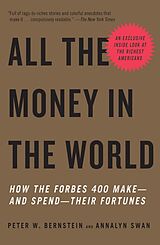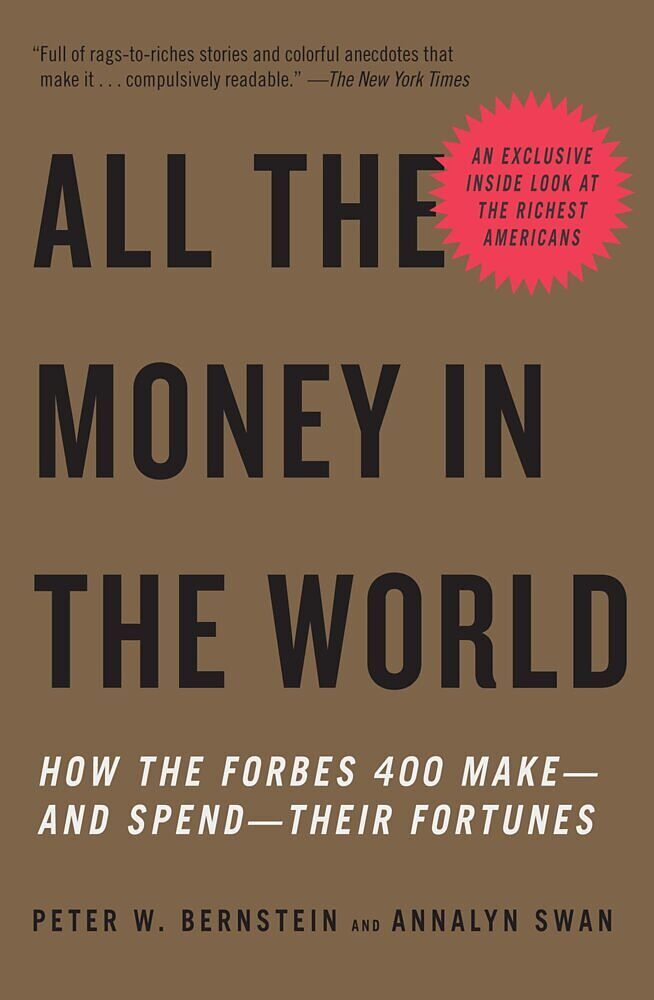All the Money in the World
Einband:
Kartonierter Einband
EAN:
9780307278760
Genre:
Management
Autor:
Peter W. Bernstein, Annalyn Swan
Herausgeber:
Knopf Doubleday Publishing Group
Erscheinungsdatum:
02.12.2008
Published to coincide with the twenty-fifth anniversary of the Forbes 400, ALL THE MONEY IN THE WORLD, the work of a team of prominent editors and business writers, goes behind the celebrated list to paint a vivid and revealing portrait of the wealthiest Americans of the past quarter century. Abundantly anecdotal, with insights gleaned from original research, the book shows how the superrich succeed, how fortunes are made in various industries, and how, once made, they are saved, enhanced, and sometimes squandered.
Informationen zum Autor PETER W. BERNSTEIN and ANNALYN SWAN are veteran journalists and editors who between them have worked at U.S. News & World Report , Time , Newsweek, and Fortune m agazines over the last twenty-five years. Bernstein is the co-editor of The New York Times Practical Guide to Practically Everything and editor of T he Ernst & Young Tax Guide. Bernstein and Swan are cofounders of ASAP Media, which helped produce Secrets of the Code: The Unauthorized Guide to the Mysteries Behind the Da Vinci Code . They live in New York City. Klappentext From Wall Street to the West Coast, from blue-collar billionaires to blue-blood fortunes, from the Google guys to hedge-fund honchos, All the Money in the World gives us the lowdown on today richest Americans. Veteran journalists Peter W. Bernstein and Annalyn Swan delve into who made and lost the most money in the past twenty-five years, the fields and industries that have produced the greatest wealth, the biggest risk takers, the most competitive players, the most wasteful family feuds, the trophy wives, the most conspicuous consumers, the biggest art collectors, and the most and least generous philanthropists. Incorporating exclusive, never-before-published data from Forbes magazine, All the Money in the World is a vastly entertaining, behind-the-scenes look at today's Big Rich.
Klappentext
From Wall Street to the West Coast, from blue-collar billionaires to blue-blood fortunes, from the Google guys to hedge-fund honchos, All the Money in the World gives us the lowdown on today richest Americans. Veteran journalists Peter W. Bernstein and Annalyn Swan delve into who made and lost the most money in the past twenty-five years, the fields and industries that have produced the greatest wealth, the biggest risk takers, the most competitive players, the most wasteful family feuds, the trophy wives, the most conspicuous consumers, the biggest art collectors, and the most and least generous philanthropists. Incorporating exclusive, never-before-published data from Forbes magazine, All the Money in the World is a vastly entertaining, behind-the-scenes look at today's Big Rich.
Zusammenfassung
Full of rags-to-riches stories and colorful anecdotes that make it ... compulsively readable. The New York Times
Cogent, fluid, encyclopedic in its detail, this book touches on almost every aspect of getting and spending [money]. International Herald Tribune
A well written and edited compilation of facts and anecdotes..... Gilt inevitably produces guilt. Providence Journal
All the Money in the World is not just scholarly; it's also highly readable and provocative. BookPage
Leseprobe
Chapter 1Education, Intelligence, DriveThe notion of a good education as a ticket to the good life is deeply ingrained in the American psyche. Studies show over and over that there s a strong correlation between schooling and future earnings. It s a central tenet of billionaire Michael Bloomberg, New York City s 108th mayor, who has taken on the city s failing education system with gusto. Nothing is more important than education, says Bloomberg, so you re seeing the better educated getting the greater percentage of the wealth. And education is only going to become more important as we get into a more and more complex world. If this is so, how did David Murdock, son of a traveling salesman and a high-school dropout, amass a net worth of more than $4 billion in real-estate development and the food business? What transformed onetime welfare recipient Tim Blixseth, a high-school grad, into a billionaire timber lord?And what turned eighteen-year-old Thomas Flatley, who left Ireland with $32 in his pocket and no advanced education, into a $1.3 billion real- estate mogul? One thing is certain: It was not the hallowed halls of an ivy-covered university.For members of the Forbes 400, who have reached the financial apex, you would expect a basic requisite to be a college diploma, if not an MBA assuming, of course, they didn t inherit their riches. Yet Murdock, Blixseth, and Flatley all made fortunes with little formal schooling. And they aren t alone. Four of the five richest Americans on the 2006 Forbes 400 list software king Bill Gates, casino impresario Sheldon Adelson, Oracle s Larry Ellison, and Microsoft cofounder Paul Allen, whose combined net worth in 2006 came to a staggering $110 billion are all college dropouts. The only university grad among the top five is America s second-richest man, genius investor Warren Buffett, who graduated from the University of Nebraska in 1949. In fact, in any given year over the past twenty- five years, about 10 percent of the Forbes 400 either dropped out of high school, only graduated from high school, or never finished college.If you ask the nation s richest man, Bill Gates, what s behind his success, he ll attribute his accomplishments to a sort of chaos theory: My success just proves that life is chaotic . . . some butterfly did the right thing for me. Buffett uses a different metaphor but holds out a similar explanation for his success (and it doesn t refer to his 1951 master s degree in economics from Columbia University). As Buffett puts it: I was wired at birth to allocate capital. But of course, success is not as simple, or as elusive, as those responses suggest.To begin with, there s the matter of raw intelligence. For most of the decades prior to the early 1990s, the notion of intelligence quotient, or IQ, was paramount in explaining why some people excelled at certain tasks. But the use of IQ scores as a measure of future success, except for gauging results on academic tests, has since fallen out of favor. It seems hard to argue that IQs don t matter when you consider that Bill Gates s score is reportedly a mind- boggling 170, far above the 130 or so required to become a member of Mensa, the high-intelligence society, and even higher than Albert Einstein s reputed 160. What s more, Gates s successor-to-be at Microsoft, Steven Ballmer (2006 net worth: $13.6 billion), is said to have an equally impressive score. But one of the failings of such tests becomes obvious when you consider that not all high-IQ individuals achieve the financial status of Gates and Ballmer, while many people who score poorly turn out to be megabillionaires. It s not a magical measure of people s capacities, but just one more test that you can be good or not good at, says K. Anders Ericsson, psych

Leider konnten wir für diesen Artikel keine Preise ermitteln ...
billigbuch.ch sucht jetzt für Sie die besten Angebote ...
Die aktuellen Verkaufspreise von 6 Onlineshops werden in Realtime abgefragt.
Sie können das gewünschte Produkt anschliessend direkt beim Anbieter Ihrer Wahl bestellen.
Loading...
Die aktuellen Verkaufspreise von 6 Onlineshops werden in Realtime abgefragt.
Sie können das gewünschte Produkt anschliessend direkt beim Anbieter Ihrer Wahl bestellen.
| # | Onlineshop | Preis CHF | Versand CHF | Total CHF | ||
|---|---|---|---|---|---|---|
| 1 | Seller | 0.00 | 0.00 | 0.00 |
